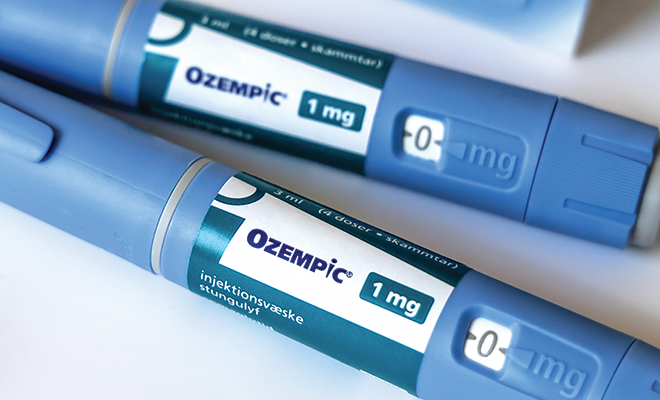
Weight Loss Shots: What to Know
By now, you probably know someone who is taking or has taken a diabetes shot for weight loss. Touted by celebrities and TikTok influencers, Ozempic® and Wegovy® are two of the most popular brand names for semaglutide, a drug that was originally designed to treat type 2 diabetes.
Semaglutide mimics a naturally occurring hormone called glucagon-like peptide-1, or GLP-1, that helps restrain the appetite by signaling to the body that it is full and prompting the stomach to empty at a slower pace. In turn, the medications can lower blood sugar levels and suppress hunger, leading to weight loss.
Ozempic and Wegovy are designed to be injected as a shot once a week in the stomach, thigh or arm. To take them, a person uses a pen-like device with a needle the size of a human hair to inject themselves in the abdomen or thigh.
Approved by the FDA to effectively treat diabetes for years, semaglutide was recently approved by the FDA under the brand name Wegovy to treat obesity and for those who have health problems related to excess weight. Like many medications, these drugs are used off label specifically for weight loss.
Not surprisingly, these drugs have become hot shots! Ozempic prescriptions tripled from 2021 to 2022 and in early 2023, the FDA named Ozempic and Wegovy two of dozens of medications in short supply. The manufacturer of semaglutide stated that the company was experiencing intermittent supply disruptions due to the combination of high demand from the public and overall global quantity limitations. As of mid 2023, the supply and demand seemed to be more stable.
Just as with any medication, these shots can carry side effects that vary among users. People taking Wegovy or Ozempic may experience gastrointestinal issues, dehydration, nausea, diarrhea and constipation. In rare cases, the medication could increase the risk of pancreatitis or cause thyroid issues. But side effects rarely last longer than a week or so, especially if patients are guided by an experienced practitioner who starts dosage low and gradually increases the medication.
It’s no wonder Wegovy and Ozempic are popular, since these drugs can help transform someone’s health, not just with weight loss, but everyday life. By losing weight, some patients can perform activities they couldn’t do before such as tying their shoes more easily or taking the stairs. Semaglutide can ultimately decrease chronic health issues linked to obesity and diabetes, such as the increased risk of stroke or heart attack.
When monitored by a healthcare professional, weight loss injections are generally safe. However, because injections are more invasive and cause more discomfort than oral medications, expected side effects can include pain and bruising at the injection site. Giving a shot to yourself may be very challenging to some, but since it is required only weekly, the results can be well worth it.
As with other drugs, when someone stops taking the shots, the effects eventually wear off. Obviously, individual results and long-term outcomes will differ, but obesity and excess weight are variable and often lifestyle oriented. So, given how Wegovy and Ozempic work, people may experience rebound weight gain if they discontinue using them. Since the active ingredient mimics the satiety hormone in our bodies, a person taking the drugs will feel full faster and longer. When the shots are no longer injected, people are likely to feel hungrier and crave sweets or other foods as they did before the using the medication. Appetite may increase, so users may no longer feel satisfied with smaller meals. Some people may experience loss of energy as the weight comes back, sometimes more weight than was lost.
These aren’t cheap shots, either. Taking semaglutide solely for weight management isn’t part of traditional insurance coverage, and most companies view weight loss drugs as lifestyle enhancers. Without insurance, the price for Wegovy is around $1,300 for a 28-day supply, and Ozempic can cost around $900 monthly. People who don’t meet the FDA’s criteria for obesity or excess weight with at least one weight-related condition such as high blood pressure, type 2 diabetes or high cholesterol, are generally considered ineligible for coverage. Currently, there are no generic versions of semaglutide, and as a new medication, the cost is subject to the pricing of the manufacturer.
For long-term, healthy weight loss, good nutrition and consistent exercise are the most trusted methods for achieving optimal health. However, we occasionally discover that even the most well-followed diets and exercise regimens could use a boost. But before making a beeline to your doctor to get that shot prescription, consider the variables, the costs and your pocketbook. Medication can buy us time, but it doesn’t correct the root of the issues.
Sources: nytimes.com, health.harvard.edu, nbcnews.com and medicalnewstoday.com.







